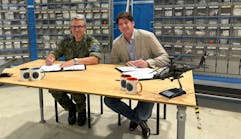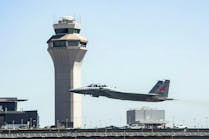The Boeing T-7A Red Hawk achieved three recent milestones, propelling the advanced pilot trainer for the U.S. Air Force forward.
Climate Chamber Test: T-7A aircraft APT-3, one of five engineering and manufacturing development aircraft, underwent rigorous testing at Eglin Air Force Base, enduring temperatures ranging from -25°F to 110°F. This test evaluated the aircraft system’s performance, including propulsion, hydraulic, fuel, electrical, secondary power, environmental control, and overall operations in extreme environmental conditions. The aircraft has since returned to St. Louis for testing.
Escape System Test: Boeing and the Air Force conducted a dynamic sled test in February at Holloman Air Force Base in New Mexico. The test focused on design enhancements in the Collins Aerospace, an RTX business, ACES 5 ejection seat and Pacific Scientific EMC’s canopy fracturing system to reduce the risk of injury. During the test, the team implemented variable timing to slow down the ejection seat, using the drogue chute and investigated canopy fracturing system patterns. The team is now preparing to move forward with the next round of development testing.
Flight Control Law: Boeing completed development in February of a new software flight control law and since then, has flown the aircraft more than 10 times, reaching 25-degree angle of attack. Additionally, three of those flights demonstrated the aircraft’s ability to achieve fine tracking while in high angle of attack, a key capability for pilot training. Incorporation of control law 17.5 clears the path for the Air Force to start high angle of attack and departure resistance testing at Edwards Air Force Base.
“The T-7A Red Hawk is poised to revolutionize pilot training, delivering enhanced safety, performance and adaptability, and completing these three milestones shows significant progress in the program’s development,” said Evelyn Moore, vice president and program manager, T-7 Programs. “We will continue with flight testing and the next round of escape system testing throughout this year and into 2025.”
While the T-7A Red Hawk continues to progress in testing and flight completions, Boeing is also building a new production line for low-rate initial production (LRIP) of the T-7A. The company is slated to load the first forward and aft fuselages for LRIP midyear as suppliers are already underway developing parts for production.



